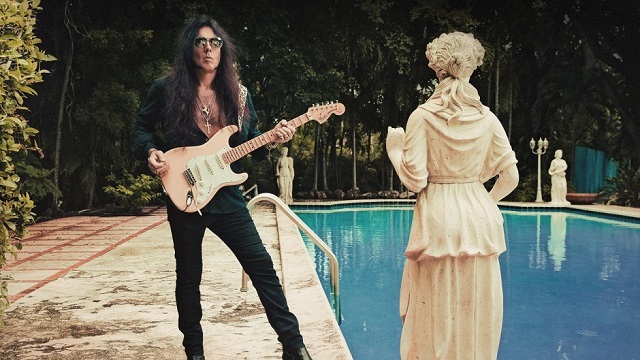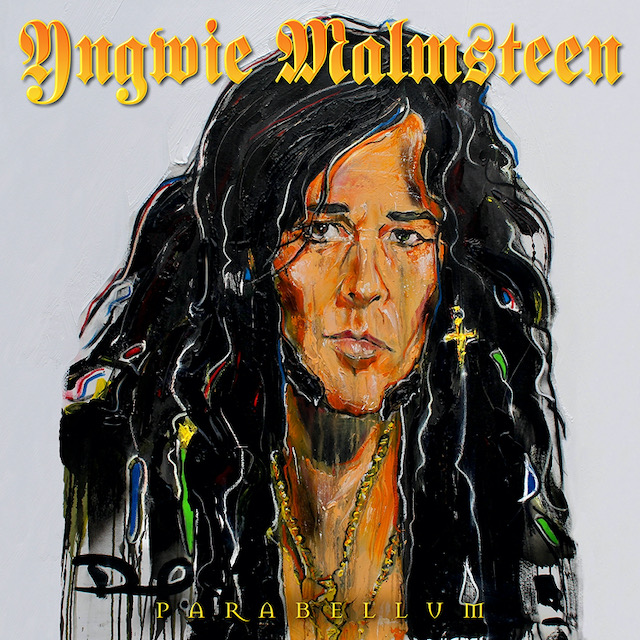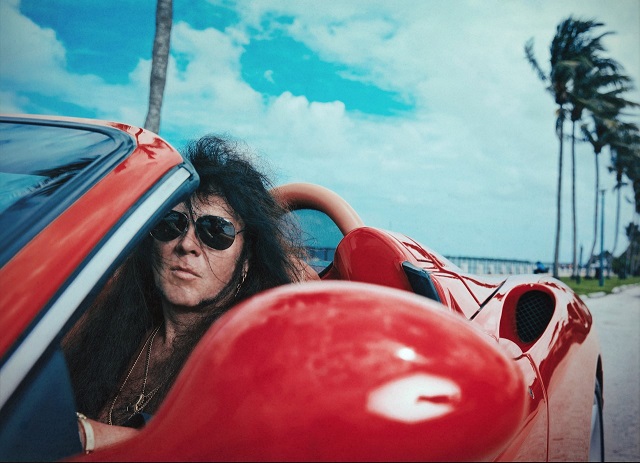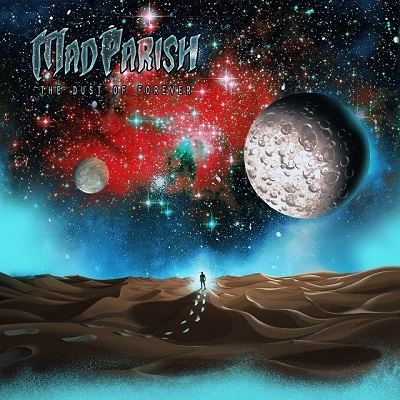YNGWIE MALMSTEEN - “Now I Don’t Have Any Influences At All ... What I Do Is This”
September 12, 2021, 3 years ago

I didn’t. But with the long-healthy and hale Yngwie Malmsteen, fired up about life and his new album Parabellum, I actually feel like I could have and he’d deliver. But the wider point he’s making is that it would be against his intense artist philosophy, one that has resulted in a new album of extreme pure Yngwie to the point where there are only four songs with vocals on the album, and those are by Malmsteen, who is in fact a great singer with a rich and interesting voice—those are two separate things.
“You know how they always say pandemic this, pandemic that,” begins the maestro, framing the new album for us down the phone line from his longtime home in Florida—just like another guitar hero, Pat Travers, Yngwie left the north for sunny climes. “Two things played into that. One, I live in Miami and they never shut this town down. It was always open, always perfect, so you wouldn’t even know the pandemic was going on. However, two, I couldn’t go on tour. With World on Fire, I started recording it and then I went on tour and so on. Which is not actually a bad thing; it’s kind of a good thing.”
“But on this one, I had a lot of time to like detail the songs, detail the music. Which means I can go in and harmonize or put a little something there like a backing vocal, build things around it. So this one I think has a lot more stuff going on, tympani’s, all sorts of things. Because what I do, my favourite thing to do is top-down, drive my Ferraris—that’s what I do. But when I’m in the car, I listen to what I did the night before or the day before or two days before. And therefore the song comes back to me a little differently, and I go back to the studio and I change the tempo or whatever. It was undiluted, undistracted time in the studio, for almost a year. But for the solos, I wouldn’t go, ‘Oh yeah, let me do ten takes on a solo.’ No, I didn’t do that. My whole thing about this album is that it’s very pure, in a sense. I probably came up with 80 or 90 ideas and had to compress it down to ten.”
“And the reason I do this is because if you asked me… like, you can ask me right now. ‘Hey, Yngwie, write me a country western song.’ ‘Yeah, call back in ten minutes; it’ll be ready.’ Or whatever. Death metal or reggae, you name it. ‘Write me a blues tune.’ I could do it, completed; you can have it. However, for me, that’s not the magic. The magic is when something comes to me spontaneously from somewhere. I don’t really know how it happens. It just happens, it’s amazing and I go, wow, great. So that’s what I captured on this album. This is only like the purest, high-grade stuff (laughs).”

Listen to the production on Parabellum, and you can hear the results of the car thing. By crowding everything to the mid-range, he’s made an album that cuts through noise like Jesse James Dupree with a chainsaw.
“Absolutely, oh yeah,” agrees Yngwie. “Because when it goes into the car it sounds different. And the music has to compete with the engine too, because you know, with the Ferrari, the music comes from the engine. It’s like pleasure and work, business together with play, when I’m driving around. And I try to listen to it more as like a listener. Whereas when I’m in the studio it’s almost impossible to do that. Because in the studio, I’m the producer, I’m the songwriter, I’m the performer, I’m the singer, I’m everything. So it’s a kind of one-sided perspective. Whereas when I listen to it in the car, I can listen to it a little more from far away. So it does make a difference.”
Specifically on my assessment of slamming everything into the middle of the sound picture, Yngwie gives a typically thoughtful answer (he’s really got purely musical reasons for doing everything he does, very admirably, I might add).
“Yeah, I mean, for instance, the way that I like to mix bass guitar—which I play always—I think a lot of people misunderstand the bass instrument, because they think it’s just holding down the root. But it’s not. The bass could play the third, it can play the octave, it could play all sorts of things, like counterpoint lines. So the bass is mixed in… it’s sort of like a Fender Jazz bass, a really cool old jazz bass, which has a really kind of note-y sound. So instead of just a low frequency, you can actually hear the notes, which I think is really cool.”
“I mean, you can always add more low end when you listen to something; you can always put more bass on it if you want,” suggests Malmsteen. “But I didn’t really look at it that way. I just wanted it to sound musical. When I write music—let’s say in the rock ‘n’ roll spectrum or whatever—I write it very much like a classical ensemble. Bach once said that the greatest sin is to have the instruments play in unison. And if you listen to Bach, it’s all counterpoint and harmony. And I’m not knocking it, but some rock bands play the bass, guitar, vocals, the same line, you know? And that’s cool too, but that’s not what I want. So in order for that to come through, you have to pan things right, and you have to make sure that they’re not either too bassy or too toppy. You find the musical value for each instrument.”
This goes for drums too, which are also quite exacting on Parabellum, not too pillowy or analog. Performing that duty here is Lawrence Lannerbach, who also did Yngwie’s blues album, Blue Lighting. Asked what he wants out of a drummer, Yngwie figures, “I want a drummer to keep down the beat and do syncopation. Every single lick—everything—is written down. I’m a drummer, okay? In fact, I’ve got some balls too. Because when I had Cozy Powell as a drummer, I said, ‘Let me go behind your kit.’ And I did and I played the intro to ‘Stargazer,’ because I know how to play that. And he goes, ‘Nice job, son.’ So yeah, I can play all the double-kick stuff. I could’ve actually played the drums myself, but that would be too much. But I’ve been a drummer all my life. My grandfather was a drummer, my brother was drummer, I was a drummer in school, there were drums all around the house at the time, so I know exactly how drumming works.”
“When I look back at it—you’re going to laugh a bit—when I was eight years old, my eighth birthday, listen to this, eight, not 18, in communist Sweden, there was no radio, no
TV, nothing. It was just really like a big black tundra. And I got for my birthday, Deep Purple Fireball. You know how that album starts? (sings the drums). And I said, that’s the coolest fucking thing I ever heard. And that was only time Ian Paice had two bass drums. I didn’t know that. Everyone thought it was single bass, which is crazy. But anyway, I very, very early on learned to love, hard-edged music, the drumming and the Marshall stacks and the smoke bombs and shit like that. And when I got heavily into classical music, which was when I was like nine or ten, I wasn’t going, ‘Oh, I’m gonna start playing classical music.’ No, I’m gonna play rock, but with more than five notes in an octave, which is the blues scale, a five-note scale. So that’s what happened. Obviously this is many, many, many years ago, but the point is, this is a natural thing for me. My way of life, especially on this new album, is completely uninfluenced. I’m undiluted and uncompromised. There’s no compromise, there’s nothing! It’s just the music that comes out of me—that’s all it is. This could be for better or worse or whatever, but now I don’t have any influences at all—what I do is this.”

I never understood why people take swipes at Yngwie’s singing, but they do. As far as I’m concerned, he’s got the perfect New Wave of Swedish Heavy Metal voice. Disappointingly, I asked him about that stuff but he knows none of that music, having “left Sweden with a guitar and a fucking toothbrush and good riddance,” meaning all that cool music like Europe, Overdrive, Torch and 220V… from LA doing Steeler and Alcatrazz and Rising Force, he was unaware it was happening.
But back to the singing, Malmsteen says, “I grew up in a family where everybody was singers. My uncle is an opera tenor, who does opera is Sweden, stuff like this. So I kept on hearing vocal exercises all day long. And basically what my approach is, whatever the melody is, you have to express the melody, and then you embellish with the vibrato and harmonies and so on. Some people like to put a little distortion on it or whatever and that’s cool, but I’m more into the melody. Melody to me is the whole thing about music. To quote Amadeus Mozart, he says ‘Melody is music; music is melody.’”
Yngwie disagrees that there’s a little bit of “hard living” in his voice, lending it additional richness, the voice of experience. “No, I never really thought about that. Hard living? I’m the cleanest living person you ever met.”
But that hasn’t always been the case. “No, not always (laughs). No, no, no, no. But the last 16, 17 years, I’m like pure as the driven snow. I’m talking about, you know, no alcohol, no drugs obviously, nothing like that, but also drinking a bunch of water and taking vitamins and exercising. I’m fucking definitely on top of that stuff. I feel better now than I did when I was 25, so I don’t know about the hard living. Talk to Brian Johnson about that, although I love him—he’s awesome.”
(Photos by: Austin Hargrave)











